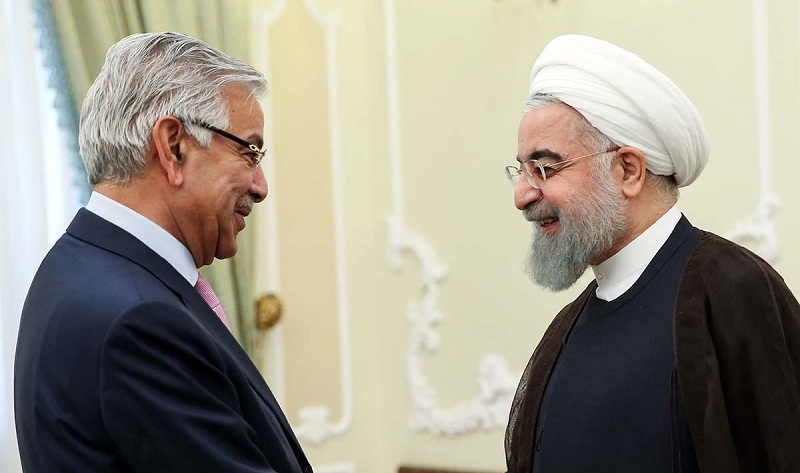Alwaght- The Pakistani Foreign Minister Khawaja Muhammad Asif visited Iran and Turkey in past few days to discuss ways to settle the Afghan crisis, less than a month after Islamabad-Washington tensions escalated over the new US strategy in Afghanistan.
The American President Donald Trump has recently announced tenets of his new strategy for the war-ravaged Afghanistan, accusing Pakistan of being duplicitous in taking stances on the crisis in Afghanistan and dealing with the US there. The president further said that Islamabad “provides safe havens for the agents of chaos, violence, and terror.” Furthermore, the American leader called on the Islamabad leaders to very immediately take transparent stances on the cooperation with the US in Afghanistan.
The US has recently crept towards stronger partnership with India, Pakistan’s traditional rival in the region, as part of the reviewed strategy in the Indian Peninsula, and urged New Delhi to activate its role in the neighboring Afghanistan, a call that looks quite unacceptable in the eyes of Islamabad. If the Indian leaders decide to positively respond to the American suggestion and build their presence in Afghanistan, Pakistan will be encircled by India from two sides.
The Trump’s fresh roadmap and distancing from Islamabad very significantly drew strong condemnations from the political and popular circles in Pakistan, but the government has declined to severely criticize the president's comments, having in mind that any more escalation of tensions will lead to the US cutting of its financial and military aids to Pakistan and perhaps Islamabad will lose its strategic position in Washington’s regional strategy.
Instead, the Pakistani leaders preferred consulting the issue with the regional countries before making any official decision. Islamabad priority, it appears, is shrugging off US accusations and threats using improvement of relationship with regional countries such as China, Russia, Iran, and Turkey. But Pakistan has something to worry about. Perhaps the big Islamabad concern is that it does not know to what extent these countries can build partnership to meet its needs once the South Asian nuclear power decides to allow things to go worse with the US.
The Pakistani politicians have said that no American officials from now on are allowed to make surprise visits to Pakistan until Washington lifts pressures on Islamabad and reviews its redesigned regional policy towards Pakistan. In late August, the visit to Islamabad of the Acting United States Special Representative for Afghanistan and Pakistan Alice Wells was postponed on Pakistan’s request.
During the US invasion of Afghanistan in 2001, the then-US President George W. Bush put strains on then-Pakistan President Pervez Musharraf, once an army general, for Islamabad's alleged support for Taliban. Bush further said that the Pakistani leader had to choose between siding with the militant group and cooperation with the US.
The same pressures by the American administration are currently building on Pakistan. The only difference is that presently the civilian politicians, not a military general, are ruling the country. The ruling Muslim League party is in a state of confusion as it is facing increasing duress for making a choice between collaboration with the US and thus leaving behind what terump calls double-standard policy or adopting a confrontational way of dealing with Washington.
John McCain, the chairman of the US Senate Committee on Armed Services, during his visit to Kabul on July 4 had said: “Terror safe havens in Pakistan no longer acceptable.”
But Pakistan is not in a position to risk further escalation of tensions with the US, because Washington will pick New Delhi as fresh partner in Afghanistan. This can help the Americans take on Pakistan and China simultaneously in the region. Pakistan severely objects to the Indian sway in Afghanistan, as it is worried about possible American pressures to accept a New Delhi-desired settlement to Kashmir dispute.
If India and Afghanistan engage in a regional alliance under the US support, Pakistan will apparently be stripped of its important regional position, something posing substantial risk to Islamabad interests. Under these threats to its regional clout, Washington, analysts suggest, will eventually change its Afghanistan policy. First Pakistani step to this end might be encouraging part of Taliban body to go to the negotiating table for peace talks with Kabul government.
Commenting on the new US Afghan strategy, the Pakistani FM earlier maintained that the new roadmap should be shared with the regional actors for coordination as all are parties to possible peace deal. He said "Our stance on the American president’s new Afghanistan strategy is clear. From now on, Islamabad will conduct no official negotiations with Washington, and we will be responsive only if an American official contacts us.”
There is a notion that by moving closer to the powerful regional countries like Iran and Turkey Pakistan wants to send the message to the US that Islamabad will not yield to pressures in any conditions, and that it can resort to other options. It seems that Pakistan has copied Turkey’s behavior in dealing with the West. Ankara headed to East after relations with EU and the US went frayed. Normally, embarking on a pluralistic, multi-partner policy expands any actor’s maneuvering power on the diplomatic stage.



























